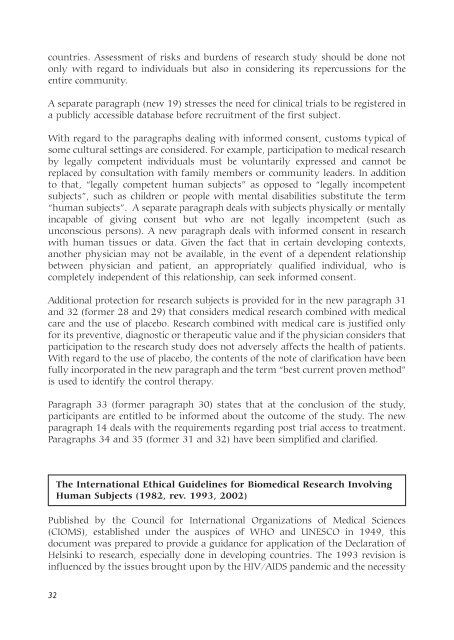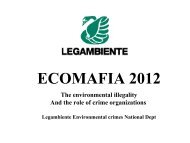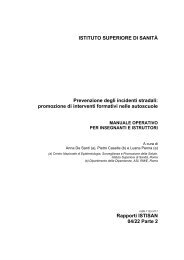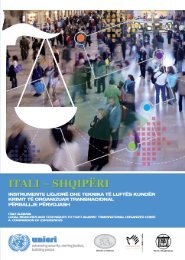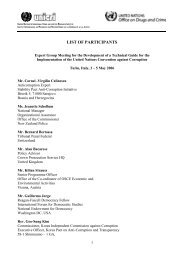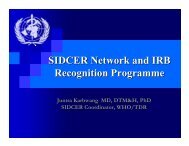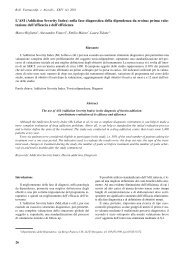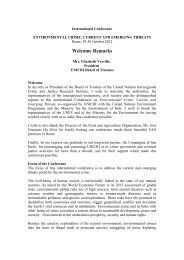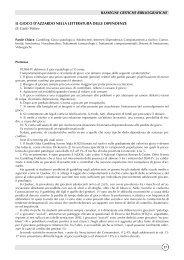Biomedical Research in Developing Countries - UNICRI
Biomedical Research in Developing Countries - UNICRI
Biomedical Research in Developing Countries - UNICRI
You also want an ePaper? Increase the reach of your titles
YUMPU automatically turns print PDFs into web optimized ePapers that Google loves.
countries. Assessment of risks and burdens of research study should be done not<br />
only with regard to <strong>in</strong>dividuals but also <strong>in</strong> consider<strong>in</strong>g its repercussions for the<br />
entire community.<br />
A separate paragraph (new 19) stresses the need for cl<strong>in</strong>ical trials to be registered <strong>in</strong><br />
a publicly accessible database before recruitment of the first subject.<br />
With regard to the paragraphs deal<strong>in</strong>g with <strong>in</strong>formed consent, customs typical of<br />
some cultural sett<strong>in</strong>gs are considered. For example, participation to medical research<br />
by legally competent <strong>in</strong>dividuals must be voluntarily expressed and cannot be<br />
replaced by consultation with family members or community leaders. In addition<br />
to that, “legally competent human subjects” as opposed to “legally <strong>in</strong>competent<br />
subjects”, such as children or people with mental disabilities substitute the term<br />
“human subjects”. A separate paragraph deals with subjects physically or mentally<br />
<strong>in</strong>capable of giv<strong>in</strong>g consent but who are not legally <strong>in</strong>competent (such as<br />
unconscious persons). A new paragraph deals with <strong>in</strong>formed consent <strong>in</strong> research<br />
with human tissues or data. Given the fact that <strong>in</strong> certa<strong>in</strong> develop<strong>in</strong>g contexts,<br />
another physician may not be available, <strong>in</strong> the event of a dependent relationship<br />
between physician and patient, an appropriately qualified <strong>in</strong>dividual, who is<br />
completely <strong>in</strong>dependent of this relationship, can seek <strong>in</strong>formed consent.<br />
Additional protection for research subjects is provided for <strong>in</strong> the new paragraph 31<br />
and 32 (former 28 and 29) that considers medical research comb<strong>in</strong>ed with medical<br />
care and the use of placebo. <strong>Research</strong> comb<strong>in</strong>ed with medical care is justified only<br />
for its preventive, diagnostic or therapeutic value and if the physician considers that<br />
participation to the research study does not adversely affects the health of patients.<br />
With regard to the use of placebo, the contents of the note of clarification have been<br />
fully <strong>in</strong>corporated <strong>in</strong> the new paragraph and the term “best current proven method”<br />
is used to identify the control therapy.<br />
Paragraph 33 (former paragraph 30) states that at the conclusion of the study,<br />
participants are entitled to be <strong>in</strong>formed about the outcome of the study. The new<br />
paragraph 14 deals with the requirements regard<strong>in</strong>g post trial access to treatment.<br />
Paragraphs 34 and 35 (former 31 and 32) have been simplified and clarified.<br />
The International Ethical Guidel<strong>in</strong>es for <strong>Biomedical</strong> <strong>Research</strong> Involv<strong>in</strong>g<br />
Human Subjects (1982, rev. 1993, 2002)<br />
Published by the Council for International Organizations of Medical Sciences<br />
(CIOMS), established under the auspices of WHO and UNESCO <strong>in</strong> 1949, this<br />
document was prepared to provide a guidance for application of the Declaration of<br />
Hels<strong>in</strong>ki to research, especially done <strong>in</strong> develop<strong>in</strong>g countries. The 1993 revision is<br />
<strong>in</strong>fluenced by the issues brought upon by the HIV/AIDS pandemic and the necessity<br />
32


